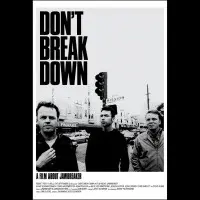Way back when, I was going to a pretty typical midwestern college, fresh off a stint at a pretty typical midwestern community college, and fresh out of a midwestern punk band. One of the guys in the band gave me a crash course on diverse strains of punk that took me beyond the Epitaph, Fat, and Lookout sounds. Resultantly, I fell for bands like Hüsker Dü and the Replacements. I also started finding some varied strains of contemporary independent and punk rock like Fugazi, Sleater Kinney, Guided By Voices, and Shellac. In my deep dive, I kept hearing about this “jaw” band. Kind of like Steve Albini, I struggled to figure out whether I was supposed to check out Jawbreaker or Jawbox (the answer was both). To me, Jawbreaker were this enigma, something I was supposed to listen to, but couldn’t really figure out. But then I did, and it was glorious.
Don’t Break Down is a documentary that charts the rise, fall, and re-emergence of Jawbreaker. Premised around the idea of the three band members (Blake Schwarzenbach, Chris Bauermeister, and Adam Pfahler) coming back together at a studio to listen back to their records and reminisce a bit, Don’t Break Down gives a glimpse into the tensions and talents that made Jawbreaker great, but also had the potential to tear them apart.
As they go back through each of the records, we get discussions on the methodical and talented drumming of Pfahler, the contrapuntal aspirations of Bauermeister, and the literary inspirations of Schwarzenbach. Billie Joe Armstrong and Mark Kates (of Geffen Records) comments on the “throne” that so many thought Jawbreaker would ascend to and the absolute power they gave off in concert and on record. Others, including Jessica Hopper, talk about the literary lyrics and how they were a sort of relief set against the typical love and lost love song tropes that have inundated pop music since its inception. There’s laughter and connection and dedication.
There’s also awkwardness, tension, and eventually, reconciliation. Don’t Break Down delves into a band of two camps, one made up of high school friends Blake and Adam, the other made up of Chris. Almost nervously engaging throughout, Chris mostly comes across as the odd man out, the one who talks to fill awkward silences. Meanwhile, early in the film, Blake is depicted as completely detached. Attempts at humor are met with emotionless expressions and inquiries are met with silence more often than not (and not without reason, as Blake explains his reluctance as a sort of attempt to maintain the mystery of the music, terrifically referencing Newton and rainbows along the way). And Adam, the more talkative of his camp, plays the go-between, trying to find the peace between the two more extreme characters. Near the end, Blake posits on missing the feeling of being in a band, and he picks up the guitar and plays a quick Jawbreaker studio reunion (an early teaser to the more recent tours). To be sure, personality differences aren’t the only struggle. There’s also forays into the tension surrounding punk “politics” and major label headhunting, infighting over contributions and artistic freedoms when recording, and the general failing of friendships. Watching the film, it’s easy to see how tensions led to a split.
Don’t Break Down is an interesting watch. I’ve seen it three times in the past couple of days and have found it engaging each time. You get a bit of a behind-the-scenes peek into the songwriting and record creation, you get a bit of band drama and tension, and you get a seemingly happy ending through their reemergence. And, in many ways, much of the mystery of the band remains refreshingly intact. I think fans of Jawbreaker will find something to like here. It’s a great portrayal of one of the more cerebral and sophisticated bands.
